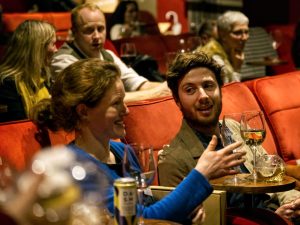Many of you will have seen the 2023 film adaptation of Alan Bennett’s ‘Allelujah’, or perhaps some of you were fortunate enough to see the original theatre production, either in person at The Bridge Theatre or as a cinema relay. Either way, the theatrical release of a story all about the care and rehabilitation of older people in the NHS set our geriatrics hearts afire – were our specialty and our patients finally going to get the positive exposure and recognition they so deserve?
One arm of our research work is in undergraduate medical education in geriatrics at Bristol Medical School. As part of our 18-week clerkship, ‘Complex Medicine in Older People’ (CMOP), we run a student book club, with the play script for ‘Allelujah’ amongst the original recommended texts. Thus, fuelled by a desire to bring the page to life for our students, we organised ‘Allelujah for Ageing’ – a private film screening of ‘Allelujah’ (2023), followed by an expert panel discussion. Medical students and staff were invited, along with geriatricians, nurses, sixth formers aspiring to go to medical school, older Bristol residents, and stakeholders who advocate for older people in the community and in research, including The Dunhill Medical Trust and AgeUK.
The panel was expertly chaired by Dr Emily Henderson, Associate Professor in ageing and movement disorders at the University of Bristol. The panellists were triumphant: Geraldine Peacock CBE, former Chief Charity Commissioner, Dr Lucy Pollock, geriatrician and author of ‘The Book About Getting Older’, and Sarah Mistry, Chief Executive of the British Geriatrics Society. We were delighted to have so many thoughtful reflections and questions from medical students and sixth formers in attendance.


Sarah led on discussions of the characterful portrayals of older people – a refreshing departure from the ‘homogenising ageism’ we’ve become accustomed to on screen. Judi Dench and David Bradley particularly shone, although it is hard to choose favourites from such a talented cast. Lucy agreed that she enjoyed the realistic inclusion of older peoples’ sense of humour, and the camaraderie that develops between patients who remain in hospital for a long time. This ‘characterfulness’ was something that the original play lacked, which therefore made the film more enjoyable than its predecessor for those of us who had seen both.
Geraldine shared personal anecdotes from a recent admission to hospital, and remarked on how the film was realistic enough to have brought back memories from this time, particularly how differently care is approached between different wards in the same hospital. She shared her experience of age as ‘the mind wearing out the body’, a rhetoric she feels was reinforced by the pressures on the health system during the COVID pandemic. Yet, despite this she reflected that there were still many hospital staff who advocated for her and ‘fought to get her better’, and the film reminded her that ‘despite many of them [NHS staff] having an awful time, they knew we [patients] were having an even more awful time’.


Whilst Geraldine felt that the film was realistic in its portrayal of the care of older people (except the ‘opulent furniture’!), the clinicians on the panel and in the audience generally disagreed. The expansive day room still being used as originally intended (rather than converted to a clinical area), and the never-ending supply of pillows were just some examples highlighted of the unrealistic portrayals of the practicalities of inpatient care. Lucy particularly felt Bennett had ‘got the wrong end of the stick’ when it came to the cost of care; she disagreed with the film’s message that ‘we just need to pay more’ and that ‘we shouldn’t count the cost of care’, because in reality we do have to pay attention to the cost-effectiveness of care, and also ‘good care is cheaper than bad care’. Similarly, Sarah felt the narrative of healthy older people being in hospital was unhelpful, given that the drive of health and social care services is to keep people supported in their homes for as long as possible.
Emily commented that the practice and complexity of geriatric medicine and rehabilitation were minimised by the film – a poor reflection of the ‘good practice’ described by Geraldine’s own experience, which was one of doctors’ remit broadening to become less specifically technical and more holistic. She has observed and experienced first-hand the sharing of responsibility across a multidisciplinary team, which Sarah concurred with, saying that ‘geriatric medicine is a team sport’ that extends out of the hospital and into the community. Lucy was ‘enchanted’ by the character and motives of Dr Valentine but reflected that she herself didn’t enjoy the company or care of older people as a medical student. It was only through spending time with people that she came to see the ‘humanity’ in ageing.
Whilst enjoyable, the panel agreed that the film was not a great advertisement for being old! Geraldine remarked that the best learning about ageing is achieved directly from patients, which Lucy encouraged our students to seek out – her own passion for geriatric medicine was not there from the start but grew from patient encounters. Emily agreed that geriatricians are ‘made not born’, and that the pleasure of geriatrics is in the ‘steady, holistic compassionate care, dealing with very complex medicine, balancing risks and benefits, and understanding peoples’ stories.’ We reflected on what a privilege it is to be trusted by our patients – a theme that comes across strongly in the film.
Do you have any thoughts on Alan Bennett’s ‘Allelujah’? There’s still a chance to join the conversation on Twitter, using #Allelujah4Ageing @GerisMedEd
